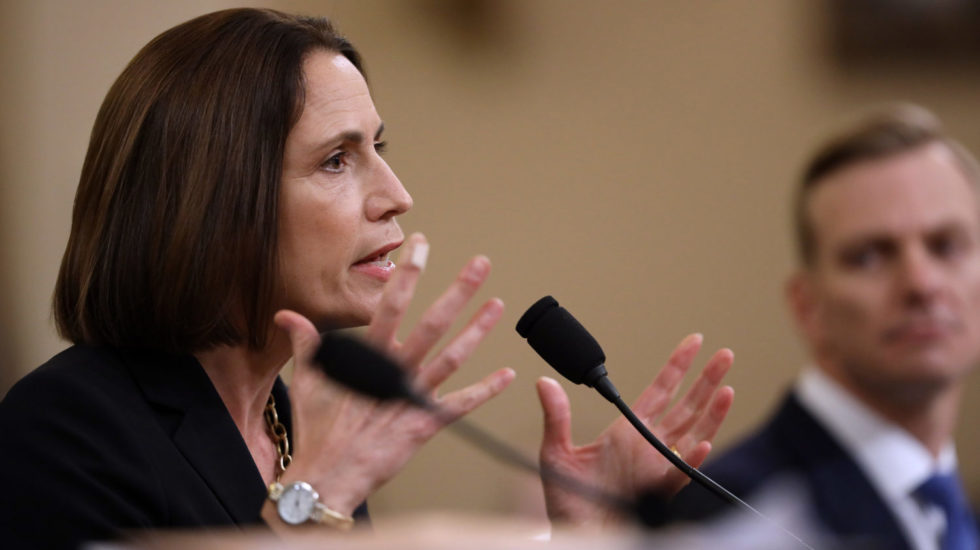President Trump’s former deputy national security adviser, Fiona Hill, chastised Republicans during the impeachment hearings for promoting Russian propaganda. Trump and his defenders responded by intensifying their promotion of that propaganda. And it’s only begun.
Hill isn’t some supposed “Deep State” bureaucrat out to get Trump. She’s an expert on Russia who authored a book about Vladmir Putin that provides insights into the psychology of the enigmatic former head of the KGB. In April 2017, Trump chose her to be his deputy assistant and senior director for Europe and Russia on the National Security Council, which is in the White House. She held that position until July 19, 2019 — remarkably long tenure for any Trump senior appointee.
But Hill put her loyalty to the United States — her adopted country — above personal allegiance to Trump when she defied his edict not to cooperate with the House Intelligence Committee’s impeachment inquiry.
Hill’s Warning and the Corroborating Evidence
Nov. 21: Testifying before committee, Hill said:
“Based on questions and statements I have heard, some of you on this committee appear to believe that Russia and its security services did not conduct a campaign against our country — and that perhaps, somehow, for some reason, Ukraine did. This is a fictional narrative that has been perpetrated and propagated by the Russian security services themselves.”
Nov. 22: The New York Times confirmed that in recent weeks — as Republican committee members of the House Intelligence Committee were pushing that Russian propaganda — the US intelligence community was informing US senators and their aides that Russia has been engaging in a years-long campaign to blame Ukraine for Russian hacking of the 2016 US presidential election.
The Trump/Republican Response
Nov. 22: Appearing on Fox & Friends, Trump repeated the Kremlin’s line that Ukraine interfered in the 2016 US presidential election. “A lot of it had to do, they say, with Ukraine,” he began, before promoting the lie that Ukraine possesses the DNC server that was hacked in 2016.
Nov. 24: Appearing on Fox News Sunday, Sen. John N. Kennedy (R-LA) said he didn’t know if Ukraineor Russia was responsible for hacking the DNC server and Clinton campaign emails.
Nov. 25: On CNN, Kennedy seemed to backtrack: “I was wrong. The only evidence I have, and I think it’s overwhelming, is that it was Russia who tried to hack the DNC computer. I’ve seen no indication that Ukraine tried to do it.”
But Kennedy’s reversal lasted less than a week. Appearing on Meet the Press on Dec. 1, he said, “I think both Russia and Ukraine meddled in the 2016 election. I think it’s been well documented.”
Nov. 26: Asked at a news conference whether Ukrainian interference in the 2016 US presidential election specifically should be investigated, Secretary of State Mike Pompeo refused to condemn the Kremlin’s propaganda. Instead, he said, “Anytime there is information that indicates that any country has messed with American elections, we not only have a right, but a duty, to make sure we chase that down.”
As Republicans Speak, Putin Laughs
At a Nov. 20 economic forum in Moscow, Putin said he was pleased with the “political battles” diverting attention away from Russia: “Thank God, no one is accusing us of interfering in the US elections anymore; now they’re accusing Ukraine.”
Even bigger than the coming impeachment battle is the struggle to save the truth.
This post contains analysis and opinion.
Steven J. Harper is a regular contributor to News & Guts and the creator/curator of the Trump-Russia Timeline. He’s an attorney, adjunct professor at Northwestern University Law School, and author of several books, including Crossing Hoffa — A Teamster’s Story and The Lawyer Bubble — A Profession in Crisis. He blogs at The Belly of the Beast. Follow him on Twitter (@StevenJHarper1).



